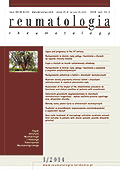
ANNALS OF THE RHEUMATIC DISEASES
Scope & Guideline
Exploring Innovations in Rheumatic Disease Management
Introduction
Aims and Scopes
- Clinical Trials and Therapeutics:
The journal prominently features clinical trials evaluating the efficacy and safety of new therapeutic interventions, particularly biological and targeted synthetic DMARDs, for various rheumatic conditions. - Pathophysiology and Biomarkers:
Research articles often delve into the underlying mechanisms of rheumatic diseases, exploring genetic, molecular, and immunological factors, as well as potential biomarkers for diagnosis and treatment response. - Patient-Centered Outcomes and Quality of Life:
There is a consistent emphasis on understanding patient-reported outcomes, quality of life, and the psychosocial aspects of living with rheumatic diseases, reflecting the journal's commitment to holistic patient care. - Epidemiology and Comorbidities:
Epidemiological studies examining the prevalence, risk factors, and comorbidities associated with rheumatic diseases are a core area of focus, contributing to a better understanding of disease burden in various populations. - Innovative Diagnostic and Monitoring Techniques:
The journal explores advancements in imaging techniques, laboratory assessments, and novel digital health technologies, aiming to improve early diagnosis and monitoring of disease activity.
Trending and Emerging
- Personalized Medicine and Genomics:
There is a growing trend towards personalized treatment approaches based on genetic and molecular profiling of patients, enabling tailored therapies that improve outcomes. - Impact of COVID-19 on Rheumatic Diseases:
Research exploring the effects of COVID-19 on patients with rheumatic diseases, including vaccine responses and disease management during the pandemic, has become increasingly prevalent. - Microbiome Research:
Emerging studies investigating the role of the gut microbiome in rheumatic diseases are gaining traction, providing new insights into disease pathogenesis and potential therapeutic avenues. - Digital Health and Telemedicine:
The adoption of digital health technologies and telemedicine has surged, with studies focusing on their efficacy and patient acceptance in managing rheumatic diseases remotely. - Long COVID and Autoimmunity:
Research exploring the connections between long COVID symptoms and autoimmune phenomena is emerging, highlighting the need for rheumatologists to understand these interactions.
Declining or Waning
- Traditional Pharmacotherapy:
As the focus shifts toward biologics and JAK inhibitors, there has been a noticeable decline in studies centered on traditional non-biologic DMARDs and their long-term effects. - General Reviews without Novel Insights:
There seems to be a reduction in general review articles that do not offer new insights or significant advancements in the field, as the journal increasingly prioritizes original research findings. - Older Diagnostic Criteria Discussions:
Discussions and analyses surrounding older classification criteria for rheumatic diseases have decreased, possibly due to the adoption of more recent and updated criteria.
Similar Journals

Modern Rheumatology
Exploring Breakthroughs in Rheumatic Disease ResearchModern Rheumatology is a premier journal dedicated to advancing the field of rheumatology through high-quality peer-reviewed research. Published by Oxford University Press, this journal reflects the latest developments in rheumatologic medicine, catering to researchers, clinicians, and students alike. With an H-Index highlighting its scholarly impact, Modern Rheumatology occupies a notable position, ranking Q2 in both the fields of Medicine and Rheumatology in 2023, and is listed among the top 25 journals in its category by Scopus. Spanning from the year 2000 to 2024, the journal features a diverse array of topics aimed at addressing current challenges and innovations in the field. Although it does not offer Open Access, it provides essential insights for professionals seeking to stay abreast of evolving treatment modalities and research breakthroughs. Located in the heart of the United Kingdom, Modern Rheumatology is a vital resource for anyone committed to enhancing the understanding and treatment of rheumatic diseases.

CLINICAL AND EXPERIMENTAL RHEUMATOLOGY
Exploring breakthroughs in rheumatology and immunology.CLINICAL AND EXPERIMENTAL RHEUMATOLOGY is a prestigious journal published by CLINICAL & EXPER RHEUMATOLOGY, dedicated to advancing the field of rheumatology and immunology. With a rich history dating back to 1983, the journal serves as a critical platform for researchers, clinicians, and professionals seeking to disseminate and discuss innovative findings in these rapidly evolving areas. Featuring an impressive Q2 ranking in both Immunology and Allergy, as well as Rheumatology, this journal is recognized for its high-quality contributions, placing it among the top tier of academic publications. Operating without an open access model, CLINICAL AND EXPERIMENTAL RHEUMATOLOGY is headquartered in Pisa, Italy, and publishes articles that undergo rigorous peer review to ensure excellence in research. This journal is an invaluable resource for those dedicated to improving patient outcomes through evidence-based practice in rheumatology, immunology, and related fields.

Arthritis & Rheumatology
Elevating Standards in Rheumatology ScienceArthritis & Rheumatology is a leading journal dedicated to the advancement of knowledge in the fields of rheumatology, immunology, and allergy. Published by WILEY in the United Kingdom, this prestigious journal boasts an impressive impact factor and a prominent reputation, ranking in the Q1 category across multiple disciplines, including Immunology and Rheumatology. With its high ranking of 4th out of 73 in Rheumatology and notable standings in related fields, it serves as a crucial platform for researchers, healthcare professionals, and scholars to disseminate groundbreaking findings. The journal embraces an Open Access model, enhancing the accessibility of vital research to a global audience and ensuring that knowledge dissemination is maximized. Since its inception in 2014, Arthritis & Rheumatology has been at the forefront of impactful research, fostering collaboration and innovation in tackling complex challenges within these medical disciplines. Researchers looking to explore the latest advancements and engage with cutting-edge studies in these fields will find this journal to be an essential resource.

Journal of Rheumatic Diseases
Unlocking the potential of rheumatology through shared knowledge.Journal of Rheumatic Diseases, published by the Korean College of Rheumatology, stands as a pivotal platform in the field of rheumatology, contributing significantly to the advancement of knowledge and clinical practice since its inception. With an impact factor reflecting its esteemed position in the academic community, this open-access journal promotes accessibility to high-quality research, ensuring that groundbreaking discoveries are reachable to all stakeholders in the realm of rheumatic diseases. The journal has maintained its commitment to quality, evidenced by its ranking in the Q3 category for Rheumatology in 2023, and its presence among the top quartiles of medical research. Focusing on innovative therapeutic approaches, emerging diagnostic techniques, and comprehensive reviews, the Journal of Rheumatic Diseases seeks to foster collaboration and dialogue among researchers, clinicians, and students alike. For accessibility, the journal offers numerous articles since its transition to open access in 2017, thereby facilitating research dissemination across the globe. As it converges over the years from 2019 to 2024, the journal promises to be instrumental in shaping the future of rheumatic disease research, inviting contributions that inspire new frontiers in this essential field.

SCANDINAVIAN JOURNAL OF RHEUMATOLOGY
Uniting Research and Clinical Practice in RheumatologyThe Scandinavian Journal of Rheumatology, published by Taylor & Francis Ltd, is a prestigious peer-reviewed journal dedicated to advancing research in the fields of rheumatology, immunology, and related disciplines. With an ISSN of 0300-9742 and an E-ISSN of 1502-7732, this journal has established itself as a vital platform for disseminating significant findings and innovative approaches in the management of rheumatic diseases since its inception in 1959. As a recognized scholarly outlet, it currently resides within the Q2 category for Medicine (miscellaneous) and ranks #39 out of 73 in Rheumatology according to the 2023 Scopus assessments. This reflects the journal's commitment to high-quality research and its relevance in the scientific community. Although it does not provide Open Access options, the journal's rigorous selection process ensures that only the most impactful research reaches its audience, making it a crucial resource for researchers, clinicians, and students engaged in the exploration of rheumatological and immunological challenges. The journal's broad scope encompasses ongoing studies, clinical trials, and reviews that aim to enhance understanding and treatment of rheumatic conditions, promoting collaboration and knowledge-sharing among professionals in the field.

JOURNAL OF RHEUMATOLOGY
Innovative Discoveries in Rheumatology, DeliveredJOURNAL OF RHEUMATOLOGY, published by the J Rheumatol Publ Co, stands as a distinguished platform within the fields of rheumatology and immunology since its inception in 1974. With an impressive impact evidenced by its 2023 rankings—Q1 in Rheumatology and Q2 in both Immunology and Allergy—the journal has secured its position as a vital resource for researchers and practitioners alike. The journal is dedicated to advancing clinical and experimental knowledge in the pathogenesis, diagnosis, and management of rheumatic diseases, providing a rich repository of peer-reviewed articles that drive innovation in treatment protocols and patient care. Although it operates under a subscription model, the journal remains accessible to a broad audience committed to advancing their understanding of these critical areas. Located in Toronto, Canada, it continues to attract contributions from leading experts globally, making it an essential read for anyone keen on staying at the forefront of rheumatological research and practice.

Pediatric Rheumatology
Advancing pediatric care through groundbreaking research.Pediatric Rheumatology is a leading peer-reviewed open access journal published by BMC, dedicated to disseminating high-quality research in the field of pediatric rheumatology. Since its inception in 2007, the journal has established itself as a vital resource for healthcare professionals, researchers, and students focused on pediatric immunology, rheumatology, and child health, maintaining an impressive Q1 ranking in Pediatrics and Q2 in Immunology and Allergy as well as Rheumatology for 2023. It is recognized for its impact on advancing knowledge and clinical practice, with significant contributions noted in various studies and case reports. With access options that embrace the ethos of open science, all articles published in Pediatric Rheumatology are freely available, promoting collaborative research and discussion among practitioners across the globe. The journal welcomes submissions that encapsulate innovative research, clinical trials, and reviews that address both current challenges and advancements within the pediatric rheumatology landscape.

Egyptian Rheumatologist
Exploring innovations in autoimmune disease management.The Egyptian Rheumatologist is a peer-reviewed Open Access journal dedicated to advancing the field of rheumatology. Published by Elsevier since 2011, the journal aims to disseminate high-quality research, clinical innovations, and reviews that cover a wide range of topics related to autoimmune diseases, arthritis, and musculoskeletal disorders. With an ISSN of 1110-1164 and an E-ISSN of 2090-2433, it has achieved a respectable rank of #50 out of 73 in the medicine/rheumatology category according to Scopus, positioning it in the 32nd percentile among its peers. Operating from its base in Amsterdam, Netherlands, the journal provides an accessible platform for researchers, professionals, and students, encouraging a collaborative exchange of cutting-edge knowledge that is essential for the ongoing developments in rheumatologic care and research. The Open Access model ensures that critical findings and advancements are available to a global audience, fostering further research and education within this vital field.

Reumatologia
Enhancing visibility of crucial research in Rheumatology.Reumatologia is a dedicated open-access journal published by TERMEDIA PUBLISHING HOUSE LTD that has been serving the global scientific community since 2005. The journal focuses on the fields of Rheumatology, Immunology, and Allergy, providing a rich platform for researchers and practitioners to share innovative findings, clinical insights, and methodologies. With its roots tracing back to the early 1960s and a steady convergence of quality content through 2024, Reumatologia has secured a place in the academic landscape, currently holding a Q4 rating in Immunology and a Q3 rating in both Immunology and Allergy and Rheumatology categories for 2023. While the journal ranks #42 out of 73 in the Medicine - Rheumatology category, its open-access model ensures that research is widely disseminated, enhancing visibility and accessibility to vital knowledge that shapes therapeutic practices. Located in Poznan, Poland, Reumatologia remains a pivotal source of credible research, fostering collaboration among academics, healthcare professionals, and students internationally.

Current Rheumatology Reviews
Shaping the future of rheumatology through rigorous reviews.Current Rheumatology Reviews is an esteemed journal dedicated to publishing comprehensive reviews on advancements in the field of rheumatology. Established by Bentham Science Publishers, this journal has become a vital resource for researchers, clinicians, and students seeking to stay abreast of the latest developments and therapeutic strategies from 2006 to 2024. Located in the United Arab Emirates, it caters to a global audience, delivering insights that have been pivotal in shaping clinical practices. With an impact factor reflective of its Q3 status in Rheumatology by 2023, the journal ranks #46 out of 73 in the Scopus database, positioning it in the 37th percentile in the discipline. Although it operates without open access, its high-quality content ensures that each article undergoes rigorous peer review, making the Current Rheumatology Reviews a trusted platform for disseminating critical research findings and reviews that drive forward the understanding and treatment of rheumatic diseases.